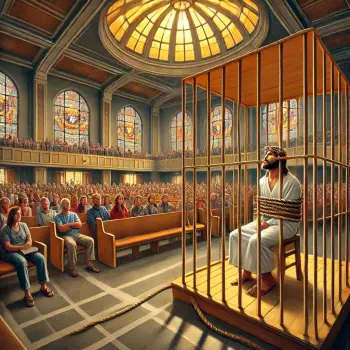
One of the problems with the church today is that we have little to no theology of the church. And the theology of the church that we do have is often incomplete and sometimes just plain mistaken.
I don’t believe that we can discuss the multitude of issues that surround contemporary western evangelicalism unless with start with a proper understanding of just what the church is!
To state my conclusion at the outset[1]: The Church is the visible body of Christ in the world.[2]
1 Corinthians 11:17-34 and the nature of the Church
1 Corinthians 11:17-34 serves as one of the main passages for the teaching of communion in most evangelical churches.
In Corinth, communion provided another opportunity for the wealthy members of the church in Corinth to shame the poor.
Regarding their services Paul states:
“But in giving this instruction, I do not praise you, because you come together not for the better but for the worse.” (1 Cor 11:17).[3]
Paul goes on to explain the problem:
“For, in the first place, when you come together as a church, I hear that divisions exist among you; and in part I believe it. For there must also be factions among you, so that those who are approved may become evident among you. Therefore, when you meet together, it is not to eat the Lord’s Supper, for in your eating each one takes his own supper first; and one is hungry and another is drunk. What! Do you not have houses in which to eat and drink? Or do you despise the church of God and shame those who have nothing? What shall I say to you? Shall I praise you? In this I will not praise you” (1 Cor 11:18-22).
It is quite significant to recognize that a large part of the context of 1 Cor 8-11 is the division that was fostered by some of the wealthy men in Corinth.
In 1 Cor 11:2-16, Paul addresses the fact that these wealthy men did not like the newfound liberties that Paul and Christianity had granted to women (see my three-part posts on Women and injustice in 1 Cor 11:2-16).
Then, in the present passage (1 Cor 11:17-34), we learn that these men were also causing divisions with the poor among them (1 Cor 11:17-34). Thus, Paul’s query,
“Or do you despise the church of God and shame those who have nothing?” (1 Cor 11:22).
Though we are not certain precisely what was happening in Corinth, we suspect that perhaps the wealthy had arrived to the home (likely of one of the wealthy members) in which “church” was to take place long before the poor—who had to work. The wealthy members then filled the ‘dining room’ area before the poor had even arrived (perhaps during their afternoon “siesta” break?).
NB: Remember, in ancient Rome, the wealthy did not labor. They simply profited off the labor of everyone else.
In addition, it may have been that the wealthy were eating their own food, getting full, and even drunk (1 Cor 11:21), before the poor, who had nothing, had even arrived.
The result is that the poor were further shamed. It must be stressed that this was a completely acceptable part of life in the Roman world. It was simply the way things worked!
Not for Paul, however!
Paul appeals to the need to eliminate the distinctions between rich and poor in the Church (cf Gal 3:28).
Paul, however, does not suggest that the social distinctions between rich and poor must disappear! He, in fact, instructs the wealthy, “go home and eat” (1 Cor 11:22).
In 1 Cor 11:17-34, Paul rebukes the Corinthians (though this rebuke may have been directed at the wealthy men only): “For there must also be factions among you, so that those who are approved may become evident among you.” (1 Cor 11:19).
Consequently, Paul concludes that when they take communion, “it is not to eat the Lord’s Supper” (1 Cor 11:20).
Paul’s (commonly misunderstood) teaching on Communion
Paul explains that before one partakes of the Lord’s Supper one must discern:
“Therefore whoever eats the bread or drinks the cup of the Lord in an unworthy manner, shall be guilty of the body and the blood of the Lord. But a man must examine himself, and in so doing he is to eat of the bread and drink of the cup. For he who eats and drinks, eats and drinks judgment to himself if he does not judge the body rightly. For this reason many among you are weak and sick, and a number sleep. But if we judged ourselves rightly, we would not be judged. But when we are judged, we are disciplined by the Lord so that we will not be condemned along with the world. So then, my brethren, when you come together to eat, wait for one another. If anyone is hungry, let him eat at home, so that you will not come together for judgment. The remaining matters I will arrange when I come” (1 Corinthians 11:27-32).
What does Paul mean when he says that we must “judge the body rightly” (1 Cor 11:27, 29)?
1 Cor 11:27, 29 says,
“Therefore whoever eats the bread or drinks the cup of the Lord in an unworthy manner, shall be guilty of the body and the blood of the Lord” (1 Cor 11:27).
“For he who eats and drinks, eats and drinks judgment to himself if he does not judge the body rightly” (1 Cor 11:29).
I suspect that you may have heard this passage before.
I also suspect that you have been taught something along the lines that any non-Christian, or any Christian who is in sin, who eats or drinks at the communion table is eating and drinking judgment on themself.
The reason, you may have been told, why they were eating and drinking judgment upon themself is because the bread and the wine (or grape juice or Coca-Cola) represent the body of Christ Himself—which is essentially true, though not the point of this passage.[4]
In other words, what is commonly taught is that judgment results when one does not properly recognize that it is Jesus’ body and blood they are partaking of—which, it is argued, non-Christians cannot do at all. Thus, for their own sakes, they should not be allowed to take communion.
I do not think that this is what does Paul means here.
The question might appear quite simple. Surely,
The problem is that, though it makes sense to say that “judging the body rightly” refers to the elements as in some way being the “body of Christ,” this position does not fit very well within the context of this part of 1 Corinthians.
NB: My goal is to keep these posts free of charge. I do not intend to ever hide them behind a paywall. I can only do this if those of you who have been blessed by them and can afford to give ($5, $10, $25, or more/month) do so. Would you please consider giving a tax-deductible contribution to support determinetruth ministries and make possible future posts like this? You may give a tax-deductible gift by following this link.
Understanding the communion passage in its context
The context of Paul’s discussion on communion in 1 Cor 11:17-34 relates to the treatment of one another within the setting of the local church.
In 8:1-11:1, Paul addresses the issue of idolatry and the weaker brother/sister. The key question here is, “can one eat meat that was sacrificed to an idol and then sold in the marketplace?”[6]
Paul’s answer distinguishes between what “knowledge” says and what “love” says (cf 1 Cor 8:1-3).
Knowledge, of course, says “yes.” After all, it is only meat (1 Cor 8:7-8) and the idol does not exist anyways (1 Cor 8:4; 10:19-20).
Love, however, says that you may the meat as long as it does not cause a brother or sister to stumble: “Therefore, if food causes my brother to stumble, I will never eat meat again, so that I will not cause my brother to stumble” (1 Cor 8:13).
Paul continues the discussion in 1 Cor 9:1-27[7] by noting that he has forsaken certain rights for the sake of others (e.g., the right to receive pay and the right to have a wife). In other words, knowledge says that he should be paid (even the oxen are not to be muzzled while treading the grain; cf 1 Cor 9:9), but love says that he will not accept any money (cf 1 Cor 9:15).
For Paul, this is what love does.[8] Love demonstrates concern for the other as pre-eminent.
In 1 Cor 10:1-22, Paul warns them about the dangers of idolatry by reminding them of what the Lord did to Israel when they associated with idols (cf 1 Cor 10:5-12). This may indicate that some of those who were advocating for the eating of such meat might well have been taking their freedoms too far and were in danger of falling into idolatry.
Then, in 1 Cor 10:23-11:1, Paul summarizes his point:
“All things are lawful, but not all things are profitable. All things are lawful, but not all things edify. Let no one seek his own good, but that of his neighbor” (1 Cor 10:23-24).
1 Cor 11:2-16, Paul transitions to the wealthy men’s efforts to suppress the newfound rights of women in Corinth:[9] Note, Paul is still addressing those who are “weaker” (though now he is speaking of weaker in the context of the Roman society).
Finally, in 1 Cor 11:17-34, Paul concludes by addressing the Corinthian’s (most likely he is referring to the wealthy men) violation of the law of love with respect to how they treat the poor during their gatherings.
As a result of their “sham[ing] those who have nothing” (i.e., the poor: 1 Cor 11:22), Paul says that, just as the Lord judged Israel (cf 1 Cor 10:5-12), so also judgment has already come upon some in Corinth. Thus, he says,
“That is why many among you are weak and sick, and a number of you have fallen asleep” (1 Cor 11:30).
Consequently, Paul urges them,
“So then, my brethren, when you come together to eat, wait for one another. If anyone is hungry, let him eat at home, so that you will not come together for judgment. The remaining matters I will arrange when I come” (1 Cor 11:33-34).
What does this have to do with communion?
Because this post is running too long, I’ll pick up this question in my next post: which will release later this week!
Many people vow to “read the Bible in a year”–they even publish special Bibles to help you do so–yet, most fail. Well, we want to help change that. We want to challenge you to study through the NT with us in 2022 (we may take longer than a year).
Click here for more details and stay tuned for our Dec 31, 2021 post.
Please share this post and let others know about determinetruth.
If you wish to view this blog on your smartphone through the Determinetruth app simply download the “tithe.ly church” app on your smartphone and insert “determinetruth” as the church name you wish to follow. Once it is loaded, simply click on the “blog” icon and they will automatically load.
If you would like to have Rob speak at your church or organization in person or via zoom, please let us know by filling out the contact info on the Contact me tab on this site.
If you would like to share your story, or if you have questions that you would like addressed in future posts, you may submit them in the Contact me tab on this site.
[1] In this post, I will defend this assertion. In the next post and beyond, I will begin to reflect on what this might mean for us.
[2] This is not to deny that the people of God who have passed away before us are not also the body of Christ. It is just that I am talking about the people of God today.
[3] I suspect that Paul might say the very same thing to many churches today. I also suspect that many of those very same churches may well reject Paul’s words just as the Corinthians rejected this letter.
[4] I am not about to enter the debate that divides Catholicism from the different forms of Protestantism when it comes to whether or not the elements “are” the body of Christ in some literal or mystical sense, or if they merely represent the body of Christ.
[5] The basic outline of the middle chapters of 1 Corinthians is easily discerned. Paul is responding to a letter that they wrote to him: “Now concerning the things about which you wrote” (7:1). Each section within the rest of 1 Corinthians, which contains Paul’s responses, begin with “now concerning” (cf 7:1, 25; 8:1; 12:1; 16:1).
[6] The context in 1 Corinthians is eating such meat sold at the marketplace. In Rev 2:14, the context is eating such meat at the pagan festivals.
[7] It is important to note that 1 Cor 9:1-27 is still on the same topic: eating meat and causing a weaker brother or sister to stumble.
[8] Note that Paul uses “love” at the start of his argument (1 Cor 8:1, 3).
[9] Again, see my post three-part posts on Women and injustice in 1 Cor 11:2-16.













